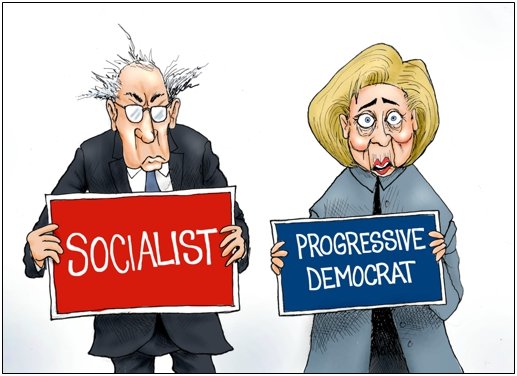By Natalia Castro
A simple Google search of “won’t vote for Hillary petition” reveals at least 5 petitions with about 10,000 signatures each of individuals swearing to never vote for Democratic frontrunner Hillary Clinton. But these are not angry Republicans or Independents, they are Democrats all backing Bernie Sanders and representing a very clear divide in the Democratic Party.
While #NeverTrump has gotten a lot of attention, with presumptive Republican presidential nominee Donald Trump accused by opponents of being divisive, it appears in her own party Hillary Clinton has taken on this role.
Erik Pye, leader of one petition amassing nearly 30,000 votes against Clinton and sent directly to Debbie Wasserman Shultz, writes “Let the DNC know they are making a terrible mistake if they nominate her. They would be disenfranchising the future of the Democratic party and setting themselves up for the great losses come general election time.”
Sanders supporters are apparently willing to lose an election rather than support Clinton. And that’s because Clinton does not represent the Democratic Party which Sanders supporters are vying for.
Clinton is the immaculate figure of big business, Wall Street and distrust, a case Sanders has made to Democratic voters throughout the process. At the Feb. 4 debate he portrayed Clinton as the establishment candidate, “She has the entire establishment or almost the entire establishment behind her. That’s a fact. I don’t deny it.”
In making that case, Sanders appears to have convinced about half of Democratic primary voters that these qualities make Clinton a fundamentally flawed candidate.
On May 5, The Atlantic’s Clare Foran defined the “Never Clinton Campaign” as a social media driven uprising against not only Clinton but the Democratic Party which approves of the status quo, turning support away from the entire political process which Clinton has come to embody. Foran quotes Sanders supporter Tara Margolin as being unrepentantly opposed to Clinton: “Just pack up your revolution and go home? Really? That’s not going to happen… She would cement in place everything we are fighting against. I could never in good conscience vote for Hillary Clinton.”
While Democratic strategists probably hope Margolin represents a small group of Democrats unhappy with the norm, Sanders is not losing the nomination by any large margin, he has maintained solid support among his loyal voter base the whole way through.
While he may need to rely on an exceedingly strong push from superdelegates to win the nomination, Sanders has received over 40 percent of the popular vote in the primaries, and continues to win key states such as Oregon and West Virginia.
Clinton will not win the nomination decisively, but in a narrow victory with a lot of discontent.
When Sanders voters decide not only Clinton but the entirety of the Democratic Party is unable to represent their needs, they are left with no place to turn on the left, and the Trump campaign magnifies.
Exit polls from West Virginia show that 44 percent of Sanders supporters would vote for Trump in the general election in the event that Sanders loses the nomination. The percent of Sanders supporters willing to support Trump far exceeds the percent willing to support Clinton, just 23 percent, and the percent simply abstaining from voting, 31 percent, clearly showing that Trump is not just a default but the second choice of many Sanders supporters.
These sentiments are represented nationally as well, with Trump and Sanders generally pulling from the same working class voter base. As the possibility for a Sanders nomination dwindles, supporters — particularly those who may be labor union members who the international trade issue strongly resonates — may be seeing Trump as their best option.
One Sanders supporter, George Massey, noted to the Boston Globe of May 17, “Hillary has proven she cannot be trusted. Trump is a roll of the dice. I would prefer to roll the dice.”
Trump may be controversial but is apparently viewed as relatively honest in comparison to Clinton by Sanders supporters. Trustworthiness is a primary pillar of the Sanders campaign, as he portrays himself as a decisive step away from the establishment, exactly what the Sanders revolutionist want.
Party platforms and politics become irrelevant when the party politician separates themselves with the usual political climate. Sanders and Trump have efficiently done this in a year that the electorate craves an outsider.
This might explain why the Trump campaign has been making a visible effort to focus on Clinton instead of Sanders. Hatred of Clinton — not merely opposition, but hatred — has bred his support network. How do you undo that? Winning Independents becomes much less of a problem, when Trump apparently may be able to win over Democrats who simply do not trust their party’s nominee.
Natalia Castro is a contributing editor at Americans for Limited Government.







